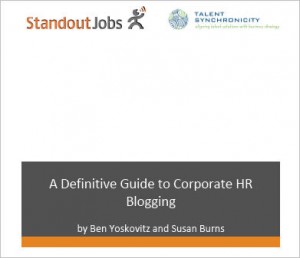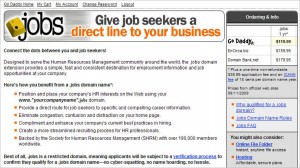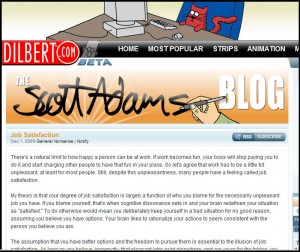Many thanks to Standout Jobs and Talent Synchronicity for A Definitive Guide to Corporate HR Blogging by Ben Yoskovitz and Susan Burns. If you haven’t downloaded a copy of this excellent ebook—do so, ASAP. For those who need some persuasion, here’s a speedy overview plus a few highlights . . .
The authors provide a guide to the guide, previewing “what you’ll learn”:
- Why blogging is important to your success
- How to develop the case for blogging
- How to get management approval
- How to handle bad news and negative criticism
- How to start a blog – the technology, definitions, and more
- How to write a blog – editorial calendars, story ideas, research
- How to build traffic – linking, social media, commenting, etc.
- How to go beyond blogging – Twitter, social networks
There’s good coverage on each of those topics—and in fact, this ebook offers both a great overview and a sturdy set of how-to steps for anyone interested in blogging, HR or not. In addition to all the basics (with examples and links to information resources), there are in-depth explorations of corporate blogging challenges, with advice on how to establish blogging policies, how to work across the enterprise, and how blogging can generate quality leads.
Here are five of my favorite quotes.
1. From “Why Blog?”: The key is to think of blogging as a long-term, evolving strategic initiative. Blogging won’t help you fill a position instantly. But it will help you expand your reach and build a community of people (readers, job seekers, etc.) that’s interested in you and your company.
2. From “Getting Management Approval to Blog”: If management can’t recognize the value of blogging you’ve got bigger problems, because that means management doesn’t understand the value of strategic recruiting and inbound marketing.
3. From “Post Topics”: Job seekers want the inside scoop on your company. They want to collect as much information as possible before deciding whether your company is the right fit. The more you can do to open your doors and provide that sneak peek inside, the better.
4. From “Staying Motivated”: It is very important to stay motivated and keep your blog updated regularly. That’s why an editorial calendar can be so helpful for advanced planning. And that’s also why having multiple authors or even guest bloggers can help a great deal.
5. From “10 HR Blogging Best Practices”: Be personable, authentic and real. Job seekers and candidates don’t want corporate-speak and buzzwords. They want information and dialogue with real people about real issues and stories.
With Twitter so much in the forefront of social media hype, it may seem like blogging is old hat. But more often than not, the two forms need each other. Blogging provides an opportunity to present information and ideas in more depth—and also to establish a personal voice or group viewpoint. Tweeting, in turn, can support and enliven the blog.
Thinking of developing a blog? Start with this ebook. Have a blog? Read it for a refresher and reminder. Don’t see blogging anywhere on your radar? The Definitive Guide will convince you to give the idea some serious consideration.





